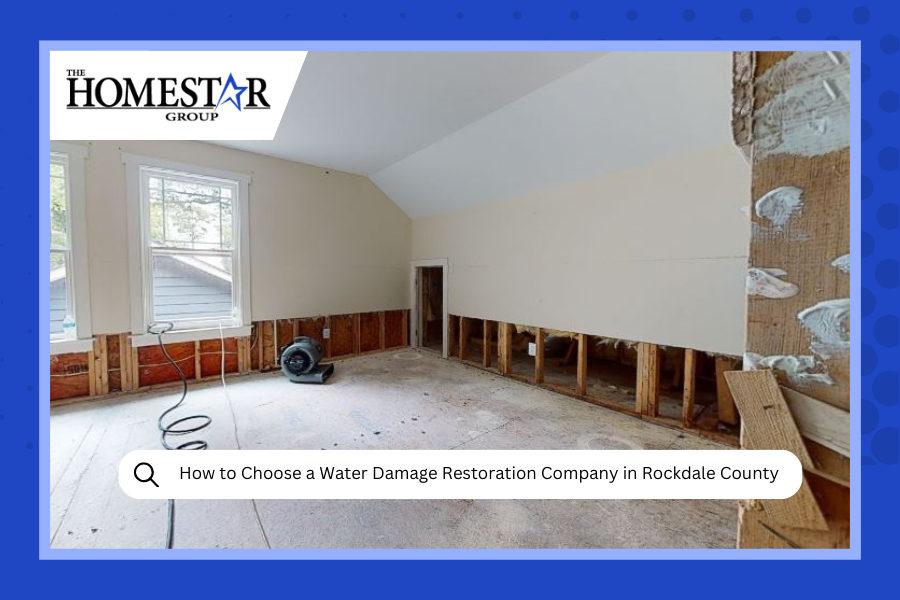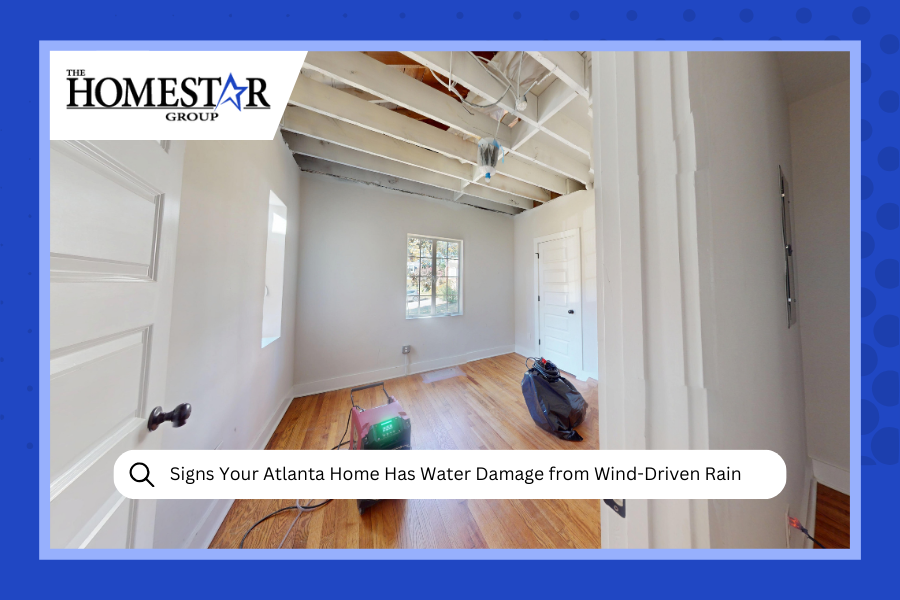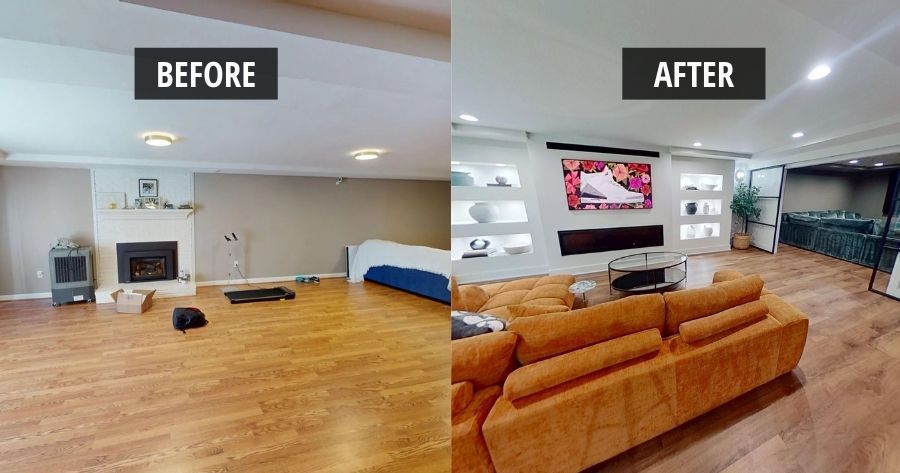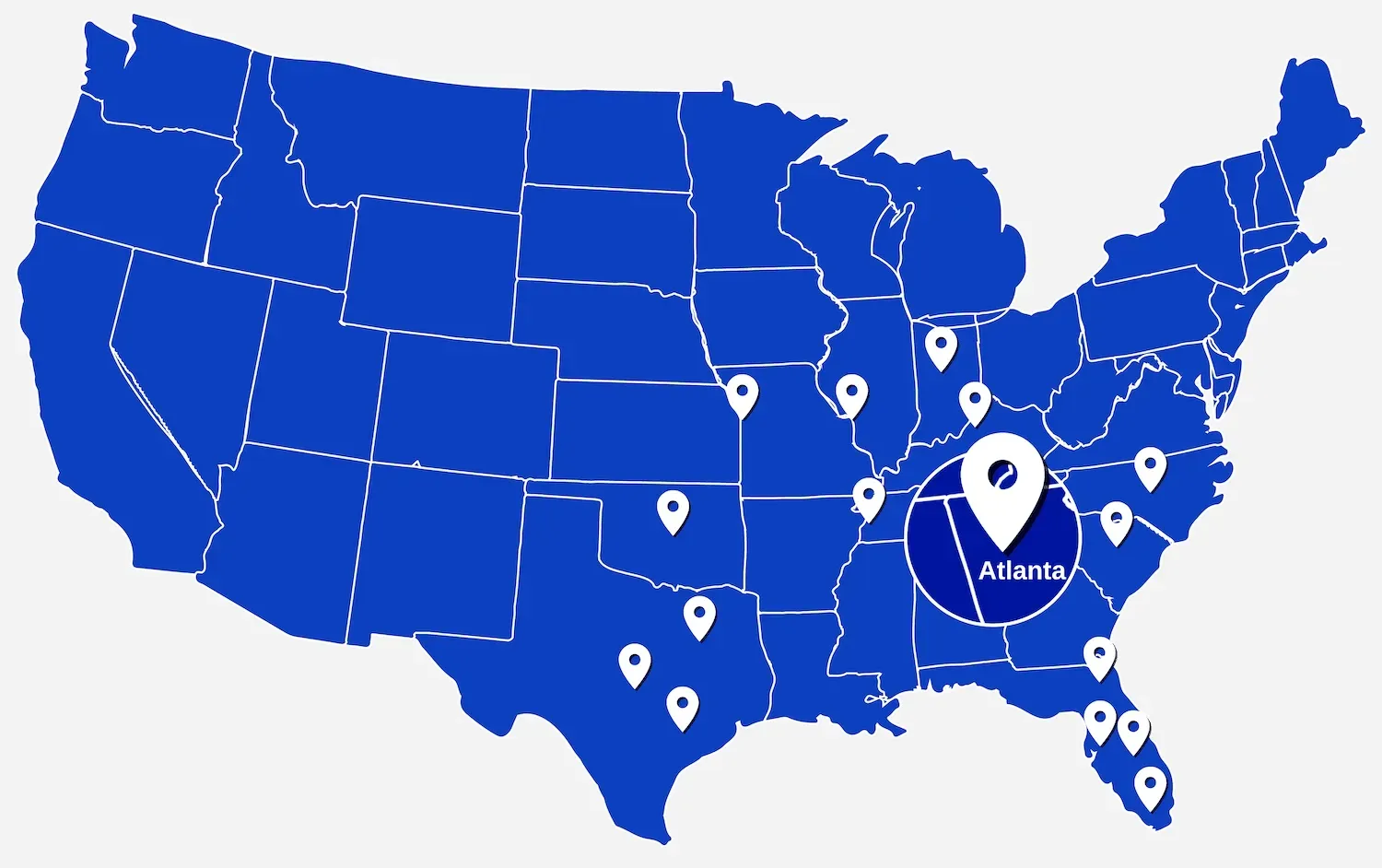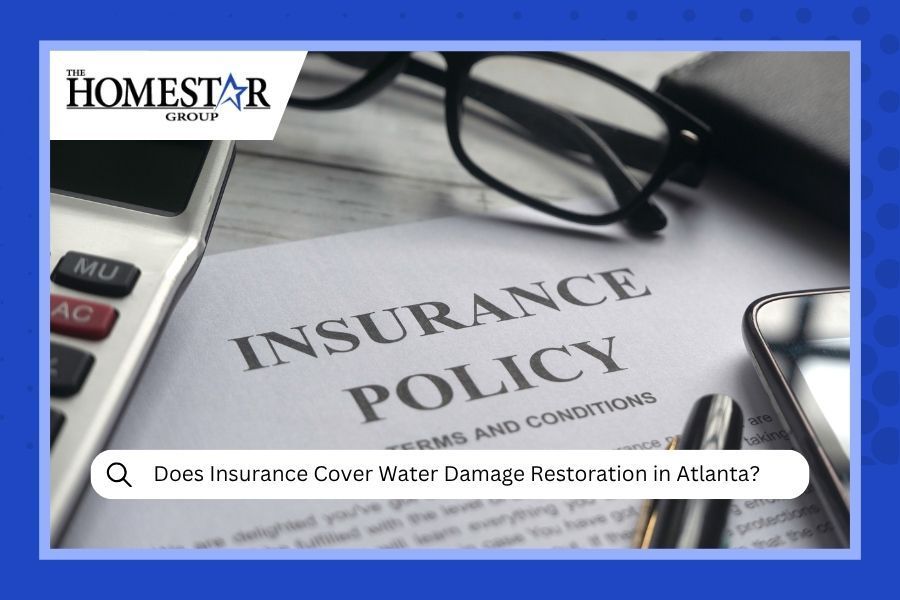
What Is Water Damage Restoration & Does Insurance Cover It in Atlanta?
Living in Atlanta means dealing with our fair share of unexpected weather. Between those sudden downpours that seem to come out of nowhere and the occasional tropical storm that decides to pay us a visit, water has a way of showing up where it's not invited. If you've ever walked into your basement after a heavy rain to find standing water, or discovered a mysterious wet spot spreading across your ceiling, you're definitely not alone.

Flash flooding is common in Atlanta during heavy rain events and can cause significant water damage to homes.
The good news? Water damage restoration is a real thing, and it's exactly what it sounds like: getting your home back to the way it was before water decided to crash your party. But there's a lot more to it than just mopping up and hoping for the best.
Understanding Water Damage Restoration: More Than Just Drying Out
Water damage restoration isn't just about grabbing every towel in your linen closet and going to town. It's a systematic process that involves assessing the damage, removing the water, drying everything out properly, cleaning and sanitizing affected areas, and then restoring your space to its pre-damage condition.
Think of it like this: when water gets into places it shouldn't be, it doesn't just sit there politely waiting to be cleaned up. It soaks into materials, creates the perfect environment for mold growth, and can cause structural damage if not handled correctly. That's where professional restoration comes in.
The Science Behind Water Damage
Water damage falls into different categories, and understanding these can help you grasp why professional restoration is so important:
Clean Water: This comes from sources like broken pipes, overflowing sinks, or rainwater that hasn't mixed with contaminants. While it might seem harmless, it can quickly become more problematic if not addressed promptly.
Gray Water: This includes water from washing machines, dishwashers, or toilet bowls (without solid waste). It contains some contaminants and requires more careful handling.
Black Water: This is the serious stuff, involving sewage, flooding from rivers or streams, or water that's been sitting for extended periods. It requires specialized equipment and expertise to handle safely.
Ready to Get Your Home Back to Normal?
Don't let water damage turn into a bigger problem. Our team at The Homestar Group provides 24/7 emergency response with free estimates within 24 hours. We've been helping Atlanta families for over 15 years, and we're here to help you too.
Get Your Free Estimate NowThe Water Damage Restoration Process: What Actually Happens
When professionals like our team at The Homestar Group arrive at your home, we're not just showing up with some fans and calling it a day. Here's what actually happens during the restoration process:
Initial Assessment and Inspection
The first step involves a thorough inspection to determine the extent of the damage. We use specialized equipment like moisture meters and thermal imaging cameras to detect water in places you might not even realize it's hiding. This isn't just about what you can see; it's about understanding the full scope of the problem.
Water Removal and Extraction
Using powerful pumps and truck-mounted vacuum units, we remove standing water as quickly as possible. Speed matters here because the longer water sits, the more damage it can cause. We're talking about preventing secondary damage like warped flooring, swollen drywall, and the dreaded mold growth.
Drying and Dehumidification
This is where the real science comes in. We strategically place industrial-grade air movers and dehumidifiers to create optimal drying conditions. It's not just about pointing a fan at wet carpet; it's about understanding airflow patterns, humidity levels, and how different materials respond to drying.
Cleaning and Sanitizing
Water damage often brings contaminants with it, especially here in Atlanta where heavy rains can cause all sorts of runoff issues. We clean and sanitize affected areas using specialized products and techniques to ensure your home is not just dry, but safe.
Restoration and Reconstruction
The final step involves returning your home to its pre-damage condition. This might mean replacing drywall, installing new flooring, or even rebuilding entire sections of your home if the damage was extensive. For comprehensive property restoration needs, our general contracting services ensure your home is completely restored.
Does Insurance Cover Water Damage Restoration in Atlanta?
This is probably the question we get asked most often, and honestly, the answer isn't always straightforward. Insurance coverage for water damage depends on several factors, including the source of the water, your specific policy, and sometimes even the day of the week (just kidding about that last part, but it can feel that arbitrary sometimes).
What's Typically Covered
Most standard homeowners insurance policies cover "sudden and accidental" water damage. This includes things like:
- Burst pipes due to freezing (though this isn't much of a concern here in Atlanta)
- Plumbing leaks that occur suddenly
- Water damage from storms (with some important caveats)
- Appliance malfunctions that cause water damage
- Accidental overflow from bathtubs, sinks, or toilets
What's Usually Not Covered
Insurance companies have gotten pretty specific about what they won't cover, including:
- Flood damage (this requires separate flood insurance)
- Gradual leaks that develop over time
- Damage from lack of maintenance
- Sewer backup (unless you have specific coverage)
- Water damage from external sources like groundwater seepage
The Atlanta Factor: Weather-Related Claims
Living in the Atlanta area means dealing with some unique weather patterns. Those sudden downpours and flash floods that are so common in our area can create tricky insurance situations. If water enters your home due to wind-driven rain during a storm, it might be covered. But if it's from rising floodwater, you'll likely need flood insurance.
Here's something many Atlanta homeowners don't realize: even if you're not in a designated flood zone, you can still purchase flood insurance. Given our area's tendency for sudden, heavy rainfall, it might be worth considering. The National Flood Insurance Program provides detailed information about flood insurance options for Georgia residents.
Working with Insurance: Tips from the Trenches
After over 15 years of helping Atlanta families navigate water damage situations, we've learned a thing or two about working with insurance companies. Here are some practical tips:
Document Everything
Take photos and videos before, during, and after the damage occurs (when it's safe to do so). Insurance adjusters need to see the extent of the damage, and having thorough documentation can speed up your claim significantly.
Act Quickly
Most insurance policies require you to take reasonable steps to prevent further damage. This means you can't just let water sit in your home while you wait for an adjuster. Quick action isn't just good for your home; it's often required by your policy.
Keep Detailed Records
Save receipts for any emergency repairs, temporary lodging, or additional living expenses. Many policies cover these costs, but you'll need documentation to get reimbursed.
Understand Your Deductible
Know what your deductible is before you need to file a claim. Sometimes the cost of repairs might be close to your deductible amount, making the claim less worthwhile financially.
Water Damage Categories and Response Times
Understanding the type of water damage you're dealing with helps determine the urgency and approach needed for restoration:
| Water Category | Source Examples | Health Risk | Response Time | Professional Equipment Needed |
|---|---|---|---|---|
| Category 1 (Clean) | Broken supply lines, sink overflows, rainwater | Low | 24-48 hours | Standard extraction, dehumidifiers |
| Category 2 (Gray) | Washing machine overflow, toilet overflow (no solids), dishwasher leaks | Moderate | 24 hours | Antimicrobial treatment, specialized drying |
| Category 3 (Black) | Sewage backup, flooding from rivers/streams, standing water over 72 hours | High | Immediate | Full PPE, advanced sanitization, disposal protocols |
The longer any category of water sits, the more likely it is to become contaminated and move into a higher risk category. This is why immediate response is crucial for any water damage situation.
Common Water Damage Scenarios in Atlanta
Our location in the Atlanta metro area gives us some unique challenges when it comes to water damage. Here are the most common situations we encounter:
Heavy Rain and Flash Flooding
Atlanta's geography and development patterns can lead to flash flooding during heavy rains. Water can enter homes through foundation cracks, overwhelmed drainage systems, or simply because there's nowhere else for it to go.
Basement Issues
Unlike some parts of the South, many homes in the Atlanta area do have basements. These can be particularly vulnerable to water intrusion during heavy rains, especially in areas like East Atlanta and Rockdale County where the terrain can direct water toward foundations.
Storm Damage
When tropical storms or severe weather systems move through our area, they can cause roof damage that leads to water intrusion. Wind can also drive rain into areas of your home that normally stay dry.
Plumbing Failures
From aging infrastructure to sudden pipe bursts, plumbing failures are a year-round concern that can cause significant water damage regardless of the weather outside.
Water Damage Restoration Checklist: Your First Steps
If you're dealing with water damage right now, here's what you should do:
Immediate Actions:
- Ensure your safety first, check for electrical hazards
- Stop the water source if possible and safe to do so
- Remove standing water if it's a small amount and safe
- Move valuables and furniture to dry areas
- Take photos for documentation
- Contact your insurance company
- Call professional restoration services
Within 24-48 Hours:
- Begin professional water extraction and drying
- Remove damaged materials that cannot be salvaged
- Start the dehumidification process
- Begin sanitization procedures
- Document all damage and restoration efforts
Ongoing:
- Monitor drying progress with moisture meters
- Continue dehumidification until moisture levels normalize
- Replace damaged materials and begin reconstruction
- Final cleaning and restoration of affected areas
The Cost of Waiting: Why Speed Matters
One thing we always tell our clients is that time is not on your side when it comes to water damage. Within 24-48 hours, mold can start growing. Within a week, you might be dealing with serious structural damage. The longer you wait, the more expensive and complicated the restoration becomes.
We've seen situations where a relatively minor plumbing leak turned into a major mold remediation project simply because it wasn't addressed quickly enough. That's why we offer 24/7 emergency services and provide free estimates within 24 hours. When water damage strikes, every hour counts.
For more insights on preventing water damage in your home, check out our guide on protecting your property from storm damage. We also have helpful tips about seasonal home maintenance that can help you avoid water damage before it starts.
Choosing the Right Restoration Company in Atlanta
Not all restoration companies are created equal, and in a market like Atlanta, you have plenty of options. Here's what to look for:
Certifications and Training
Look for companies with IIRC certification. This ensures that the technicians have received proper training in water damage restoration techniques and safety protocols. At The Homestar Group, all our technicians are IIRC certified because we believe proper training makes all the difference.
24/7 Availability
Water damage doesn't wait for business hours. Look for a company that offers true 24/7 emergency response. This isn't just about having someone answer the phone; it's about having trained technicians ready to respond immediately.
Local Experience
Atlanta has unique challenges, from our weather patterns to our local building characteristics. Choose a company that understands the local environment and has experience dealing with the specific types of water damage common in our area.
According to the Insurance Information Institute , water damage and freezing account for more homeowners insurance claims than any other cause of loss.
Insurance Experience
Working with insurance companies is almost an art form. Look for a restoration company that has experience dealing with insurance claims and can help advocate for you throughout the process.
Prevention: Protecting Your Atlanta Home
While we can't control the weather (though wouldn't that be nice?), there are steps you can take to minimize your risk of water damage:

Regular gutter maintenance is essential for preventing water damage during Atlanta's heavy rain seasons.
Regular Maintenance:
- Clean gutters and downspouts regularly
- Inspect and maintain your roof
- Check plumbing fixtures for leaks
- Inspect basement and foundation areas for potential water entry points
Weather Preparation:
- Know your home's vulnerability to heavy rain
- Have a plan for severe weather situations
- Consider upgrading drainage around your foundation
- Keep emergency contact information easily accessible
Early Detection:
- Install water detection devices in vulnerable areas
- Monitor your water bill for unusual increases
- Check basements and crawl spaces regularly
- Address small leaks before they become big problems
Need Help Right Away?
Water damage can't wait. If you're dealing with flooding, leaks, or storm damage, contact The Homestar Group immediately. We're available 24/7 and serve the entire Atlanta metropolitan area, including Marietta, Conyers, Decatur, and Stone Mountain. Don't let a water emergency turn into a major disaster.
Contact Us NowFrequently Asked Questions
How quickly does mold start growing after water damage?
Mold can begin growing within 24-48 hours in the right conditions. This is why immediate water removal and proper drying are so critical. Professional restoration companies use specialized equipment to ensure thorough drying and prevent mold growth.
Will my insurance cover emergency water damage services?
Most homeowners insurance policies cover emergency services to prevent further damage, but coverage varies by policy and situation. It's important to contact your insurance company immediately and work with a restoration company experienced in insurance claims.
How long does the water damage restoration process take?
The timeline depends on the extent of damage, but most residential water damage restoration takes 3-7 days for drying, plus additional time for any reconstruction needed. Severe damage or complex situations may take longer.
Can I handle small water damage myself?
While you might be able to handle very minor water issues, professional restoration is recommended for several reasons: proper equipment for thorough drying, experience identifying hidden damage, knowledge of potential health hazards, and assistance with insurance claims. Even small amounts of water can cause significant hidden damage if not properly addressed.

Jeremy York is the owner of The Homestar Group, bringing over 15 years of experience in the water and fire damage restoration industry to homeowners and businesses throughout the Atlanta metro area. Under his leadership, The Homestar Group has built a reputation for reliable 24/7 emergency response and professional restoration services backed by IICRC certification. Jeremy is committed to serving the local community and takes pride in helping families and business owners recover from unexpected disasters. His hands-on approach ensures every customer receives the care and attention they deserve during challenging times.

